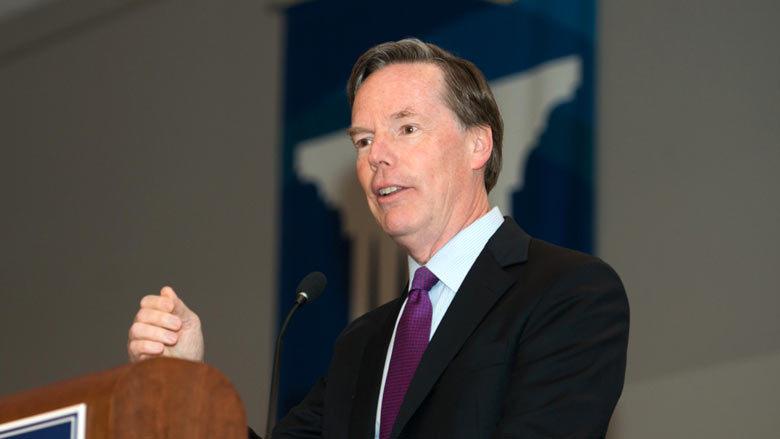Former Bush administration official concerned about Trump’s remarks on NATO
By Kelly Thomas | August 9, 2016, 6:37 EDT
 Nicholas Burns, a career diplomat, delivers the keynote address during the SCSU forum. (news.southernct.edu)
Nicholas Burns, a career diplomat, delivers the keynote address during the SCSU forum. (news.southernct.edu) CAMBRDIGE – A professor at Harvard’s Kennedy School of Government, who previously served as U.S. ambassador to NATO, has joined the growing chorus of American foreign policy and military leaders who have denounced remarks by Republican presidential candidate Donald J. Trump on the role of the United States in the defense of Europe.
Professor Nicholas Burns, who served as the U.S. ambassador to NATO from 2001-2005 and also served as George W. Bush’s Under Secretary of State for Political Affairs, last week joined a bipartisan group of thirty-six foreign policy leaders in expressing support for NATO and rebuking Trump’s “reckless comments” about the 67-year-old military alliance.
In a letter to the Washington Post that was published online August 4, Burns and others, including former Secretary of State Madeleine Albright, Gen. John Allen (Ret.) and former Central Intelligence Director Leon Panetta, write that the next American president has an obligation to lead NATO, and argue that Trump’s “cavalier denigration” of the Alliance is “worrying and objectionable.”
Trump has repeatedly voiced criticism of NATO, predominantly with respect to the economic cost to the United States of maintaining the alliance. Although each member state is required to dedicate 2% of its GDP to NATO’s defense budget, only five of the current 28 members currently do so. Twenty-three member states contribute less than 2 percent of their GDPs; the United States contributes the most, with 3.61 percent, followed distantly by Greece, which contributes 2.38 percent.
At the Republican National Convention in Cleveland last month, Trump told the New York Times: “I would prefer [to support NATO], but if we are not going to be reasonably reimbursed for the tremendous cost of protecting [countries]…Then yes, I would be absolutely prepared to tell [them], ‘Congratulations, you will be defending yourself.’”
Trump’s NATO comments created an uproar in the internationalist community, with Amb. John Bolton, a Republican, saying he is deeply “disturbed” by the remarks, and President Barack Obama chiming in that Trump shows a “severe lack of preparedness.”
Although Trump has adopted stronger language with respect to NATO financing than any previous presidential candidate, he is not the only national leader to call for changes in the way NATO is funded. In his farewell speech to NATO as Secretary of Defense in 2011, Robert Gates, who served in both the Bush and Obama administrations from 2006-2011, candidly stated that, “there will be dwindling appetite and patience in the U.S. Congress, and in the American body politic writ large, to expend increasingly precious funds on behalf of nations that are apparently unwilling to devote the necessary resources … to be serious and capable partners in their own defense.”
Democratic presidential candidate Hillary Clinton has also said that other NATO members should increase their contributions to the Alliance, but the former Secretary of State has insisted that, if elected, she doesn’t plan any drastic changes.
The person in this election cycle who has most closely echoed Trump’s views on NATO is former Democratic presidential candidate Sen. Bernie Sanders (D-VT). During the presidential primary contests, Sanders criticized wealthy NATO nations for not pulling their weight and stated:
“I would not be embarrassed as president of the United States to say to our European allies [that] the United States of America cannot just support your economies. You got to put up your own fair share of the defense burden.”
Unlike Trump’s comments, however, Sanders’ remarks on NATO did not draw the ire and condemnation of the president or the foreign policy establishment.
Sen. Angus King (I-ME), a member of the Armed Services and Intelligence committees, has noted that Trump’s concern that other member countries are not paying their fair share of NATO’s costs is shared by many policymakers and is not new. But King says that Trump has gone too far by questioning the entire premise and relevance of the security institution.
NBPForeign











